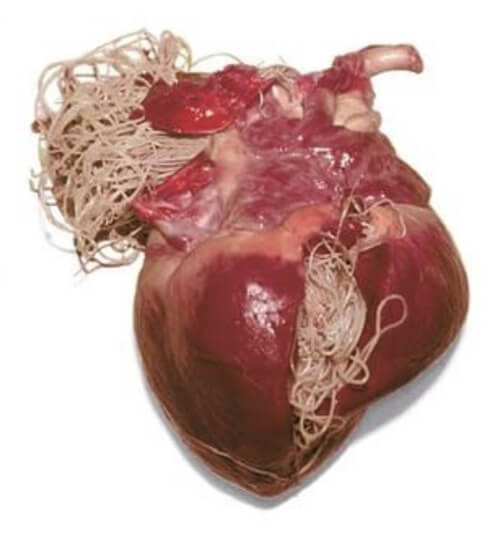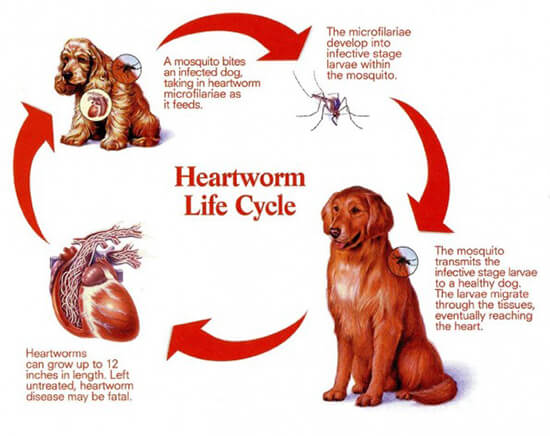Heartworms
Heartworms
What Are Heartworms?
Heartworms are foot-long worms that live in the heart, lungs, and blood vessels near the heart in pets, causing severe lung disease and heart failure. Dogs are the natural host for heartworms, but cats can become infected as well although most heartworms don’t survive to adulthood within a cat.
How do dogs get heartworms?
Heartworms are spread by mosquitos. A mosquito bites an infected dog and picks up larvae called microfilaria that are circulating in the dog’s bloodstream. The larvae undergo a lifecycle change in the mosquito and when the mosquito bites another dog, this juvenile heartworm enters the dog and then develops into an adult over the course of about 6 months. The adult heartworms then mate and produce microfilaria that can then be picked up by mosquitos and the cycle continues.
What are the symptoms of heartworm disease?
Early in the course of the disease, most dogs do not show any clinical signs. However, as time goes on and the number of worms increases the dog may begin to develop a mild but persistent cough, fatigue, decreased appetite, and weight loss. As the disease progresses the dog may develop heart failure and a pot-bellied appearance due to fluid in the abdomen.
How prevalent are heartworms in our area?
Oklahoma is considered a heartworm endemic area. We have a high number of mosquitos, and it is recommended that dogs in our area be on heartworm prevention year-round. We see lots of cases of heartworm disease in our practice.
How can heartworms be prevented?
Heartworm prevention is vitally important to your pet’s health, no less so than vaccinations and flea and tick control. We recommend starting puppies on heartworm prevention at 8 weeks of age. We typically prescribe Heartgard or Iverhart Max, both of which are chewable treats that the dog takes once a month. We recommend they be on the product year-round.
What if my dog is not currently on prevention?
If your dog is over the age of 6 months and has not been on heartworm prevention, it is recommended that they be tested for heartworms. This is a simple blood test that can be performed in the office and takes about 5 minutes to run. If your dog tests negative, heartworm prevention can be started. If your dog tests positive, it will need to be treated with adulticide therapy as preventatives only kill the larval stage that the mosquito transmits to the dog, not the adults.
What if my dog tests positive for Heartworms?
If your dog tests positive for heartworms, we will assess the dog for any evidence of damage to its heart and lungs. We will then start it on doxycycline, an antibiotic that helps to weaken the adult heartworms within your dog. We will also start it on a heartworm preventative that is safe for dogs that already are infected with heartworms so that it doesn’t get any more heartworms than it already has and keep it on prevention for the next 6 months. At that time, if the dog is young and healthy enough to withstand adult heartworm treatment, we will begin that process.
Adulticide Treatment
Adult heartworms are not killed by preventatives. For this, the dog must be treated with melarsomine. With other types of worms such as intestinal worms, the dog can be given medication and the worms die and then pass out of the body in the feces. With heartworms, there is no way for the dead worms to exit the body. The immune system must gradually break them down over time. This is a rigorous process and the animal’s activity must be severely limited during this time to prevent additional damage from occurring to the heart and lungs. This is also an expensive process as melarsomine is quite costly. Preventing heartworms is much cheaper and easier than treating them. After treatment, the dog should be kept on preventatives and retested 6 months later to make sure that the infection is cleared.
How often should my dog be tested for heartworms?
It is recommended that dogs be tested annually for heartworms to make sure that the preventatives are working and to ensure that if a dose of preventative was missed or accidentally given late that the dog was not accidentally infected. This can be performed in clinic at the time of the dog’s annual exam and vaccinations.
What about my cat?
Cats are an accidental host for heartworms. They can be infected by mosquito bites, but most larvae do not survive to adulthood. Heartworms cause a completely different disease process in cats. They don’t usually have large numbers of adult worms like in the dog and the symptoms can be very subtle or very dramatic. Symptoms include coughing, asthma-like attacks, periodic vomiting, lack of appetite, or weight loss. Some may have difficulty walking, experience fainting or seizures, or have fluid build up in their abdomen. A few cats suddenly collapse or die. Cats can be tested for heartworms with a blood test in the office just like dogs but false negatives occur since cats are less likely to have adult worms that the test picks up on. If a cat tests positive for heartworms, there is no approved treatment to kill the adult heartworms. Preventatives are the only option.




